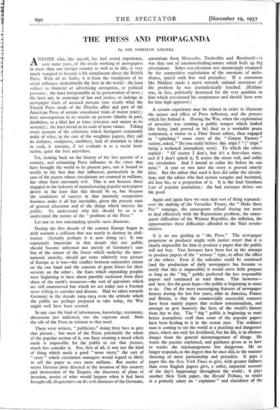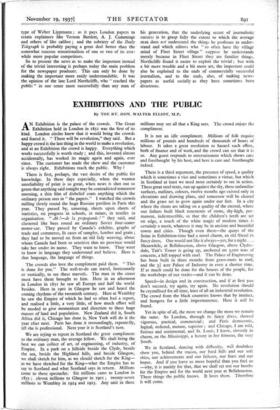THE PRESS AND PROPAGANDA
By SIR NORMAN ANGELL
ANYONE who, like myself, has had actual experience, over some years, of the inside working of newspapers in more than one foreign country as well as in this, is very much tempted to become a bit complacent about the British Press. With all its faults, it is from the standpoint of its social influence undoubtedly the best in the world: the least subject to financial or advertising corruption, or political pressure ; the least irresponsible in its presentation of news ; the least apt, in contempt of law and justice, to indulge in newspaper trials of accused persons (one recalls what the French Press made of the Dreyfus affair and part of the American Press of certain sensational trials of recent years) ; least unscrupulous in its attacks on persons (thanks in part, doubtless, to a libel law at times ferocious and unjust in its severity) ; the least trivial in its scale of news values. Taking every account of the criticisms which foreigners commonly make of what, in the case of the weightier papers, they call its dullness, stodginess, snobbery, lack of attention to ideas as such, it remains, if we evaluate it as a social insti- tution, quite the best anywhere.
Yet, looking back on the history of the last quarter of a century, and estimating Press influence in the crises that have brought the world to its present pass, one is bound to testify to the fact that that influence, particularly in the case of the papers whose circulations are counted in millions, has often been extremely evil. This is not because those engaged in the industry of manufacturing popular newspapers desire in the least that this should be so, but because the conditions of success in that intensely competitive business make it all but inevitable, given the present state of general education and of the things which interest the public. To understand why this should be so is to understand the nature of the " problem of the Press."
Let one or two outstanding specific cases illustrate.
During the first decade of the century Europe began to drift towards a collision that was nearly to destroy its civil- isation. (Actually perhaps it is now doing so.) It was supremely important in that decade that our public should become informed not merely of Germany's case but of the nature of the forces which underlay the inter- national anarchy, should get some relatively true picture of Europe as it was—the conflict between nationalist claims on the one hand and the concern of great States for their security on the other ; the fears which expanding peoples were beginning to have about possible exclusion from their share of the earth's resources—the sort of questions which are still unanswered but which we are today just a fraction more willing to consider and discuss. Had we taken towards Germany in the decade 1904-1914 even the attitude which the public are perhaps prepared to take today, the War might well have been averted.
In any case the kind of information, knowledge, testimony, discussion just indicated, was the supreme need. Note the role of the Press in relation to that need.
There were writers, " publicists," doing their best to give that picture ; but most of the Press, practically the whole of the popular section of it, was liusy creating a mood which made it impossible for the public to see that picture, much less consider it. For, first of all, it was not the kind of thing which made a good " news story," the sort of " story " which circulation managers would regard as likely to sell the paper to ever more millions. But stories of secret German plots directed at the invasion of this country and destruction of the Empire, the discovery of plans of invasion, stories of what would happen when it had been brought off, disquisitions on the evil character of the Germans, quotations from Nietzsche, Treitschke and Bernhardi—it was that sort of emotion-feeding matter which built up big circulations. Sober consideration was increasingly swamped by the competitive exploitation of the emotions of melo- drama, spiced with fear and prejudice. If a statesman like Haldane made a move towards rational treatment of the problem he was journalistically lynched. (Haldane was, in fact, politically destroyed for the very qualities in him which constituted his competence and should have won for him high approval.) A certain experience may be related in order to illustrate the nature and effect of Press influence, and the process which lies behind it. During the War, when the exploitation of atrocities was creating a public temper which looked like being (and proved to be) fatal to a workable peace settlement, a visitor to a Fleet Street editor, then engaged in " splashing " some story of the " Corpse Factory " variety, asked, " Do you really believe this tripe ? " (" tripe " being a technical journalistic term). To which the editor replied : " Of course I don't, but it's a first-class story, and if I don't splash it, X across the street will, and collar my circulation. And I intend to collar his before he can mine." A year or two later the story is proved utterly false. But the editor that used it first did collar the circula- tion, and the editor who had certain scruples and hesitated, did lose his, or a proportion of it. It is the fatal Gresham Law of popular journalism : the bad currency drives out the good.
Again and again have we seen that sort of thing repeated : over the making of the Versailles Treaty, the " Make them Pay " rampage, the consequent refusal during ten years to deal effectively with the Reparations problem, the conse- quent difficulties of the Weimar Republic, the inflation, the opportunities these difficulties afforded to the Nazi revolu- tionists.
It is no use girding at " the Press." The newspaper proprietor or producer might with justice retort that it is dearly impossible for him to produce a paper that the public will not buy. Vast fortunes have been lost in the attempt to produce papers of the " serious " type, to offset the' effect of the others. Even if the subsidies could be continued (and the production of daily newspapers has become so costly that this is impossible) it would serve little purpose so long as the " big " public preferred the less responsible papers and continued to read them. This however— and here lies the great hope—the public is beginning to cease to do. One of the most encouraging features of newspaper history during the last few years, alike in America, France and Britain, is that the commercially successful ventures have been mainly papers that eschew sensationalism, and attempt to give honestly the facts of the world's history from day to day. The " big ". public is beginning to want better journalistic stuff than some of the popular papers have been feeding to it in the recent past. The ordinary man is coming to see the world as a puzzling and dangerous place, where not only his livelihood, but his life, is in obvious danger from the general mismanagement of things. He wants the puzzles explained, and guidance given as to how to render the mismanagement less dangerous. He no longer responds, to the degree that he once did, to the raucous shouting of_ mere partizanship and prejudice. It pays a paper like the New York Times to give, with greater fullness than- even English papers give, a sober, impartial account of the day's happenings throughout the world ; it pays another New York paper, the Herald Tribune, to retain at a princely salary an " explainer " and elucidator of the type of Walter Lippmann ; as it pays London papers to retain explainers like Vernon Bartlett, A. J. Cummings and others of like calibre ; and the sobriety of the Daily Telegraph is probably paying a great deal better than the somewhat raucous sensationalism of one or two of its erst- while more popular competitors.
So to present the news as to make the important instead of the trivial interesting is perhaps today the main problem for the newspaper producer. This can only be done by making the important more easily understandable. It was the opinion of the late Lord Northcliffe, who " reached the public " in one sense more successfully than any man of his generation, that the underlying secret of journalistic success is to grasp fully the extent to which the average man does 1131 understand the things he professes to under- stand and which editors who " so often have the village mind of Fleet Street village " suppose he understands merely because in Fleet Street they are familiar things. Northcliffe found it easier to exploit the trivial ; but with a bit more trouble and a bit more art, the important could also be exploited to the ends of commercially successful journalism, and to the ends, also, of making news- papers as useful socially as they have sometimes been disastrous.

















































































































 Previous page
Previous page